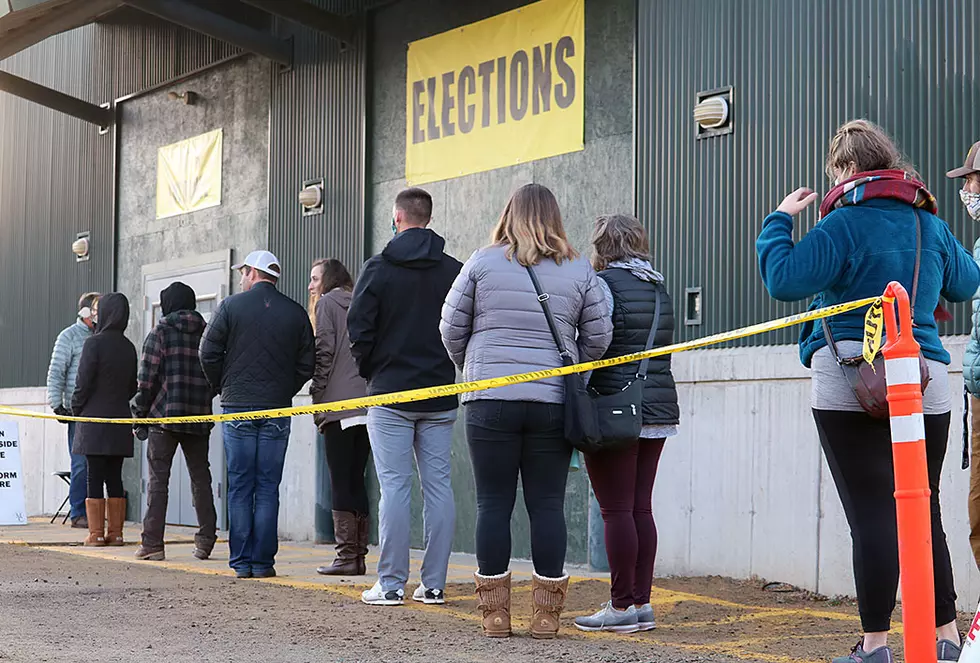
Montana GOP considers ending Election-Day voter registration
(DAILY MONTNAN) Legislative Republicans debuted the first of their “election integrity” proposals Friday with a bill to end Election-Day voter registration in Montana, which has been on the books since 2005.
The bill’s sponsor, Florence Republican Sharon Greef, said it’s a necessary solution to the long lines and hours-long waits on voting day in the last and prior elections — and something that could reduce the burden on the county offices that oversee polling places.
“One of our biggest problems is trying to run an election in a decent way that is organized when you still have people coming in to register to vote (on Election Day),” said Doug Ellis, the top elections official (as well as clerk, recorder, treasurer and superintendent) in Broadwater County, in support of the measure.
But several opponents of the bill testified Thursday that the solution to administrative burden at the county elections level isn’t to restrict voting, especially if it means cutting off late registration the Friday before election day, as Greef is proposing.
“We don’t need to end register to vote (on Election Day), we just need to invest in more open, and more free and fair elections,” said Keaton Sunchild, the political director of Western Native Voice, an organization supporting civic engagement among indigenous people in the Western U.S.
Montana’s Native American residents are among the many communities that benefit from same-day registration, opponents of the bill said. Tribal reservations are huge and often lacking in infrastructure. Plus, Sunchild said, it’s become de facto among many indigenous Montans to vote — and if necessary, register — on Election Day.
Students, who often change their addresses, the elderly, those with disabilities and those in long-term care facilities have also come to rely on late registration, opponents said.
Beth Brenneman, an attorney for Disability Rights Montana, said it’s her organization’s charge to help people in environments like those get registered and vote on time. Having Election-Day registration provides needed flexibility to that end, she testified.
“If they can’t register late, we can’t help them,” she said.
Greef said she’s just trying to make sure that voters and election workers can focus their Election Day efforts on keeping everything running smoothly, arguing that voters have a whole year to get registered and plenty of public notice to remind them.
“The focus of House Bill 176 is not to burden, it is not to disenfranchise, and not to provide a forum for a historical debate,” she said Thursday.
Ellis, the Broadwater County official, said he wants more people to vote, not fewer, and was proud of his county’s record turnout in the last presidential election: 82% of around 5,000 registered voters.
HB 176 has also earned the support of Montana’s new Secretary of State, Christi Jacobsen, who on Thursday labeled it as an effort to “strengthen the integrity of elections.” It’s one of five election bills her office is pushing this year, among them an effort to define “election security” in statute.
Almost every Montana county, whether majority Republican or Democrat, registered at least one election-day voter in 2018, the last year for which complete data is available.
Ravalli County Clerk and Recorder Regina Plettenberg, who appeared Thursday as a representative of the Montana Association of Clerks and Recorders, which is neutral on the bill, told the committee that 171 people in Ravalli registered to vote on the last two days of the 2020 election.
A bipartisan group of lawmakers passed legislation enabling Election-Day voting in 2005, netting the support of the state’s Republican Secretary of State at that time, noted Jon Ellingson, who as the Demoratic Senate Majority Leader eleven years ago ferried the proposal across the finish line. Montana is one of 20 states that allow for the practice.
“Voter turnout has risen to new heights, this can be attributed in part to the fact that voters may register on the same day that they vote,” Ellingson testified.
But in the years since, as the complexion of the Legislature has changed, lawmakers have made multiple attempts to dial back late voting on Election Day. In 2011, Democratic Gov. Brian Schweitzer, following a theme of his administration, vetoed HB180 after it passed comfortably in both legislative chambers.
Two years later, Republicans passed a ballot referral asking the voters to decide the following year whether they wanted to move back the voter registration deadline. But the resulting measure failed with 57% opposed.
“Montana voters voted overwhelmingly against these restrictions,” testified Sam Forstag from the ACLU of Montana. “Please provide Montanans with consistency and fidelity to the vote they took in 2014. “
